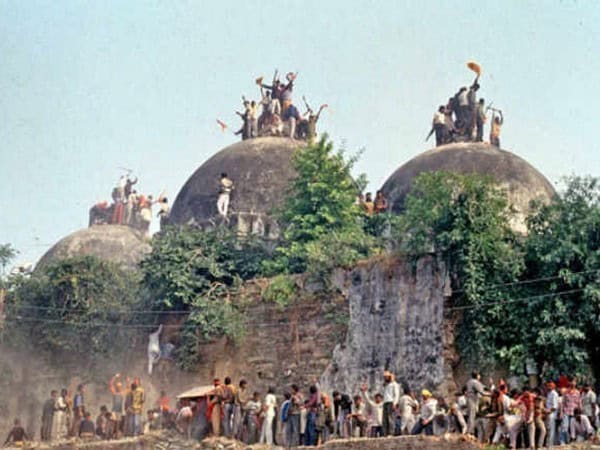Observing that people’s faith had never been in question, both Chief Justice of India Ranjan Gogoi and Justice D.Y. Chandrachud asked the lawyers to present evidence on their claim that a massive temple stood on the exact spot, instead of labouring to prove that people believed in Ram Janmabhoomi.
New Delhi: Babri Masjid-Ram Janmabhoomi title suit hearing continued on Wednesday for the 9th day. Hindu parties in the case received a setback during the hearing when the Supreme Court on Wednesday asked the Hindu parties’ lawyers to present objective evidence to show that a temple, especially one dedicated to Lord Ram, once stood on the Ram Janmabhoomi.
Observing that people’s faith had never been in question, both Chief Justice of India Ranjan Gogoi and Justice D.Y. Chandrachud asked the lawyers to present evidence on their claim that a massive temple stood on the exact spot, instead of labouring to prove that people believed in Ram Janmabhoomi.
The counsel of Hindu parties on Wednesday told the Supreme
Court that if there was a temple and people worshipped there as Lord Ram’s
birthplace, then nobody can claim ownership by adverse possession of “Ram
Janmabhoomi” (the birthplace of Lord Ram).
Senior advocate C.S. Vaidyanathan, appearing for Ram Lalla Virajman, submitted
before a constitution bench headed by Chief Justice Ranjan Gogoi that if the
‘Janmasthan’ (birthplace) was the deity, nobody can claim ownership of the
land.
“Nobody can claim adverse possession on the basis of Babri Masjid,”
the senior counsel said, stressing that the faith and belief of Hindus were
never shaken as they continued to worship at the site identified as the
birthplace of Lord Ram.
He further argued that even if there was no temple and deity, the faith of the
people on Ram Janmabhoomi as Lord Ram’s birthplace was enough. He pointed out
that putting up an idol will give the place further sanctity.
The senior counsel cited precedents of adverse possession and ownership and
said that Hindus have always expressed their desire to worship at the
birthplace of Lord Ram.
Vaidyanathan said the property cannot be transferred, sold, alienated or dealt
with in any manner under Hindu law, as unlike in the Islamic law, a person in
the capacity of trustee or ‘shabait’ cannot alienate the property.
He also claimed that the Ayodhya deity was a perpetual minor and the property
of a minor cannot be dealt with, sold or alienated. He added that the Allahabad
High Court had virtually handed over part of the property of the Ayodhya deity
to the ‘shebait’, Nirmohi Akhara.
The Hindu parties argued that there was no adverse possession by Hindus on the
basis of Babri Masjid being erected as Hindus have always expressed their
desire to worship the place.
“If the birthplace is being worshipped, the entire property becomes the
deity. If the whole property is deity, then adverse possession of it cannot be
claimed,” the senior counsel said.
After Vaidyanathan concluded his arguments on behalf of Ram Lalla Virajman,
Senior Advocate P.N. Mishra began his submissions on behalf of the Ram
Janmabhoomi Punaruddhar Samiti.
Mishra cited doctrines, tenets and beliefs to prove that there was a temple.
He cited the Skanda Purana and the Ramayana to show the exact location of Ram
Janmabhoomi.
But the bench told him that it was more interested in objective evidence than
references to scriptures.
The bench said that it was not disputing Hindu texts and faith, but wanted to
see documentary evidence.
The court asked him to show maps or objective parameters to establish the exact
location. To which, Mishra said that he will prepare notes. Thereafter, the
bench told him to prepare his notes with references and then present his
arguments.
Another party, Hindu Mahasabha was also not found ready for his arguments.
Senior Advocate Ranjit Kumar then started arguing for plaintiff Gopal Singh
Visharad, who died in 1986. Visharad was the first to file a title suit in 1950
for a declaration that he was entitled to worship at the birthplace of Lord Ram
without any obstruction and according to the rights and tenets of his religion.
As Kumar’s argument remained inconclusive, the court adjourned the matter for
further hearing on Thursday.


